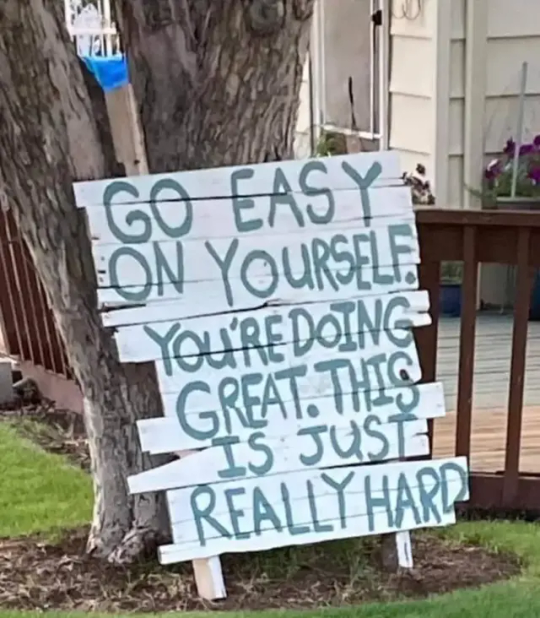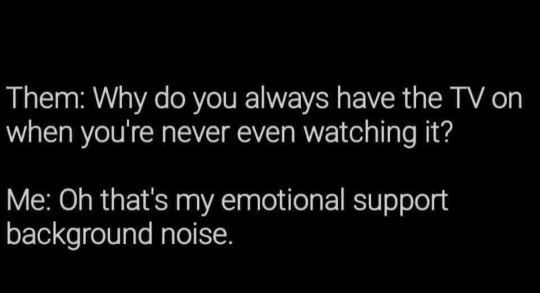#autistic adult life
Text
The ‘you’re mature for your age’ to sleeping with a bed full of plushies in your mid twenties pipeline is real
#mental health#neurodivergent#neurodiverse stuff#mental illness#journaling#actually autistic#late diagnosed autistic#asd#autistic life#autistic adult#actually autism#autism#unmasking autism
35K notes
·
View notes
Text
No no you don't understand! I want to watch this show/movie, read this book, listen to this podcast, etc.! But I must be in the right mindset and the exact head space to begin, or I just can't!
144K notes
·
View notes
Text
Neurotypicals all need to be reminded that if you made fun of someone in school for being “weird,” you were making fun of autistic people and that’s ableist and wrong. If you don’t educate yourself and change, you’re a bad person.
Things I saw kids get made fun of for:
Walking on their toes
Communicating directly
Not making eye contact
Making too much eye contact
Having special interests
Not having the right interests
Having few friends
Trying to make friends
Being “too” happy
Feeling overwhelmed
Being shy
Not talking much
Talking too much
Having fun being silly
Being serious
Doing well in class (nerd)
Doing poorly in class (stupid)
Any noticeable stims
The way we eat
A lot of other shit
Yeah, those kids were neurodivergent and you were an asshole to them. Do you see all the contradictions in that list? You never actually had a problem with anything we did or didn’t do. You had a problem with our existence. The way we talked, walked, breathed, you bullied us for it.
What’s even more disgusting and insane:
Lots of these kids chose to spend their elective periods with the special ed kids class. Lots of them grew up to be teachers, SpEd teachers, psychologists, etc. not because they want to help autistic people, but because they want to feel superior.
A big fuck you to all of the bullies and jerks that treated us like shit simply for being different from you.
I hope you’ve changed, but I know you probably haven’t. You’re doing the same shit, all that’s changed is you’re getting paid for it now. Go to hell. (A very particular section of hell where you’re marginalized for your neurotype and forced into ABA therapy and treated exactly how you treated us).
#autism#autistic women#autistic#neurodivergent#actually autistic#adhd#audhd#actually audhd#actually adhd#actually neurodiverse#actually neurodivergent#autistic adult#autistic spectrum#autism spectrum#autism things#autism community#autistic life#autistic problems#neurodivergent problems#adhd problems#audhd problems#being autistic#being neurodivergent
5K notes
·
View notes
Text

#adhd memes#neurodivergence#adhd#adult adhd#neurodiversity#neurodiversesquad#neurodiverse stuff#autistic things#audhd#adhd adult#adulting#life is difficult#self care#self love#i think i have adhd#adhd things#adhd struggles#disability
3K notes
·
View notes
Text

#not for you#autistic life#autistic problems#autism memes#autistic adult#late diagnosed autistics#autistic people#autism community#autism#autism spectrum#actuallyautistic#actually autistic#autism world#neurodiversity#asd#neurospicey#neurodivergencies#its the neurodivergency#autism problems#autism pride#actually autism#autistic#autism things#autismmeme#autistic feels#autism support#no support#autism and society#autistic females
1K notes
·
View notes
Text

🐝 I don't watch TV, but I do this with music, podcasts & YouTube.
It's a neurodivergent thing, if you know, you know 😁
#adhd life#adult adhd#actually adhd#adhd#adhd problems#autistic adult#autism#actually autistic#autistic problems#neuro spicy#neurodivergent#neurodiversity#relatable memes#adhd memes#autism memes#trending memes#relatable stuff#relatable#trending#this is so me#i do this all the time#audhd#actually audhd#audhd things
1K notes
·
View notes
Text
in another life, i find out i am autistic at 12 instead of at 29. i am still bullied, but my parents put me in another school. i get the support i need. i find friends who love me for who i am. my mom and dad don’t yell. instead, they comfort me during my meltdowns. they support me. i grow up knowing who i am, what i am, and i learn how my body works instead of wondering why i can’t speak the language of everyone else around me despite having english as my native language.
#personal#journal#autism#autistic#actually autistic#being autistic#autistic pride#actually autism#autistic burnout#autistic adult#autistic culture#autistic feels#autistic problems#autistic things#autistic experiences#autistic community#autistic spectrum#late diagnosed autistic#autistic women#autistic life#hope#hopecore
1K notes
·
View notes
Text
Theoretically I enjoy living with people but unfortunately when you tell people you're a neuroatypical raccoon with twelve ongoing hobbies, completely random work hours, and a series of admittedly unusual lifelong compulsions they tend to hear that and go "oh haha you're trying to be Quirky okay" and then save their ten million questions and concerns for when you can't run away
#Im venting#Sometimes I HAVE TO sleep on the floor#Sometimes I HAVE TO stand on the coffee table#I own a blowtorch because sometimes I NEED TO USE A BLOWTORCH#What kind of lives are yall leading that you just NEVER HAD AN OOPSIE AND SPILLED BEESWAX IN THE KITCHEN#Like what isn't clicking here#'Why do you have a trumpet if you can't play the trumpets because I'm an ADULT#'The leopard is creepy' your FACE is creepy#Objectively I am aware that the way I do things is Not Normal but it's Normal For Me#And so many people demanding REASONS and it's exhaustingggg#I'm autistic I'm bored and I have ten thousand hobbies and a zest for life#If you don't wanna make paper mache body armor at 3pm on a Wednesday just be open about that#But like#I did warn you#I warn EVERYONE so I KNOW I WARNED YOU#*screeching*
892 notes
·
View notes
Text
part of being autistic is slowly realising that you actually live in chronic pain and all your random little physical blips and errors might actually be caused by a chronic illness???
No, but seriously, no one told me that it doesn't hurt their elbows when they shake sauce bottles... it doesn't hurt their wrists and hands to write.... it doesn't hurt their feet to drive.... they don't randomly "lose grip" on objects or find keyboards or controllers difficult to hold... I was under the assumption this was all relatively normal?
Part of the reason I didn't realise this is because I don't always realise I'm in pain. My autism already makes me hyposensitive to pain, but because my "neutral" is to always be in like a 3/10 pain state, I don't always know that I'm in pain...
#autism#asd#actually autistic#oc#neurodivergent#autism spectrum disorder#late diagnosed autistic#autistic blog#autism diagnosis#autistic life#chronic illness#chronically ill#disabled adult#disabled#probably heds#?
1K notes
·
View notes
Text
friendly reminder about stimming!
stimming is when a person does a certain repetitive action, often without realizing it. Stimming is usually common in individuals with autism, anxiety, and ADHD. It provides comfort and helps us cope with feelings. Here are some behaviors that are considered to be stims:
flapping hands
humming
biting/licking lips
hair twirling
knuckle cracking
pacing
leg bouncing
rubbing skin
If you don't stim and someone around you does, there's no need to comment on it! Making people feel bad about stimming often leads to them masking it, and that leads to heightened anxiety and discomfort. Plus just making someone feel embarrassed about something they can't control just... isn't cool. So! Friendly reminder to just! Be nice and don't be an ass!
7K notes
·
View notes
Text
How many neurodivergent kids are made to feel like it’s their fault that they are bullied? How many of them are told that if they were less ‘weird’ or made more of an effort to make friends then they wouldn’t be bullied? How many of them are told that they are ‘too sensitive’ and need to stop taking things to heart?
School can be such a hellish time for neurodivergent children and those experiences can stay with you for life.
#neurodivergent#neurodiverse stuff#actually autistic#late diagnosed autistic#asd#autistic life#autistic community#actually neurodivergent#neurodiversity#autistic things#unmasking autism#unmasking#autistic adult
605 notes
·
View notes
Text
It's either "I must do this thing RIGHT NOW or I'm going to lose it" or "the stars and planets aren't in perfect positions so it'll happen when that happens" and nothing in between.
6K notes
·
View notes
Text

#adhd#audhd#autism#autist#actually autistic#actually adhd#actually audhd#Audhd things#Adhd things#autism things#adult autistic#adult adhd#adhd struggles#neurodivergent#adhd feels#living with adhd#adhd culture#adhd stuff#adhd life
923 notes
·
View notes
Text
How to Make Friends
A more-or-less clear guide on social interactions
Growing up with heavy ADHD and generalized anxiety, it was always a bit hard for me to make friends and socialize. Despite my yearning for friendship, I was always "the quiet one" and "a loner", simply because I didn't know how to approach certain social situations, and it made any friendship I had extremely unstable (except for my sister @vive-le-quebec-flouffi, who was so extroverted and friendly it was literally impossible to escape her clutches of socialization)
As I grew older, I learned through a lot of trial and error what makes a good friendship.
Or, rather... what's the best way for someone to WANT to be your friend (without being superficial or hypocritical.)
Now, obviously, this doesn't work for everyone. But this is what I found helped me the most in social circles (especially online) and I hope it can help others too
LET'S BEGIN!
1 - Be yourself
Now that sounds very cliche and cringe, I know, but hear me out, because my opinion on this is not the same as all those feelgood inspirational movies and ads.
"Being yourself" isn't as simple as it seems. Because after all, what does "self" imply? If someone is, say, a criminal, would "be yourself" mean that they should embrace their sinful side?
No, obviously not.
"Be yourself" is a bit more nuanced, but I'll try to boil it down for you.
It just means "be unashamed of your qualities which you think are flaws". For example, "be yourself" would apply to someone who sees themselves as ugly, or maybe someone with an odd yet unharmful hobby, or a weird sense of fashion, or someone with say a handicap, a speech impediment. "Be yourself" is a sentence for the specific people who have genuine good in them, but are afraid to show it to others because they have been persecuted in the past, or are scared to be. It does NOT mean to accept genuine flaws. "Be yourself" does not include say violent anger issues, an addiction, a recent crime committed, or a generally unpleasant personality. Those are obviously not things to encourage. You can understand they may be a thing that happen to you, and accept it in your life, but that's different from being proud of it or encouraging it.
Speaking of personalities... let's talk about that
2 - Be kind
Now when some people hear that, they think it means "always smile no matter what, always look happy and positive, always agree with everyone just so you don't hurt their feelings, and never cause any drama", like you're Deku in My Hero Academia or Steven Universe in his titular show.
But that's... not quite that.
Obviously, kindness is something you use to help people feel better, to cheer up, and feel happy, and obviously to be kind, you need to have compassion, heart, empathy, and always put yourself in other people's shoes regardless of who they are. But it is not necessarily all-encompassing.
There's a rule that I think anyone learning kindness must learn. It's that sometimes, kindness means to be firm.
Not mean, of course. Not judgmental, not insensitive. Don't insult anyone, don't belittle or patronize anyone or make them feel inferior to you. That's still very rude and that's not what you want.
But what I mean is that sometimes, if you know that a person's actions towards something are wrong, especially if it's towards someone else, you must be able to point it out, and act accordingly. Don't just stand there and agree with them just because you don't want to hurt their feelings. You must still be able to know right from wrong. Kindness just means you won't be an ass about it, it doesn't mean to stay silent.
Hey, that brings me to point three!
3 - Show your own opinions
If there's one thing people hate just as much as meanness, it's those who stand by and do nothing about it.
Regardless of if you agree with them or not, if you say absolutely nothing when genuinely bad behaviour is happening, out of fear of "starting a fight", you are actively making the person who is being attacked feel alone.
I remember myself, when I was bullied in the first two grades of secondary school (11-13 years old for those who don't know) for "being ugly", I was told by my mother (who was friends with other kid's parents) that some of the kids "didn't hate me" and "didn't agree with the bullying". And I asked her "if they don't hate me, why won't they talk to me?" She never managed to answer that one. And it broke my heart, because outside of my sister, I had no one else.
Don't be like that. You may be scared of acting, but you know who would be grateful if you did act? The victims. And isn't their opinion of you much more important than the opinion of someone who acts with hatred and bigotry?
If you see someone suffering injustice, or even just hear someone who has a rather harmful opinion, don't be scared to tell them that you disagree. Obviously don't be an asshole about it, stay civil, but if you voice out your opinion, you will be seen as someone who stays true to their beliefs and is brave enough to stand up for them if the opportunity comes.
There's obviously much more that comes with social life (nonverbal cues, sense of humor, timing and mood), and I don't know everything (I'm just some random québécois girl on the internet). But I hope this was a bit more helpful. I did have fun writing this, at least. So I guess that's better than nothing!
#life hacks#tips#tips and tricks#useful#How to guide#How to#social media#social anxiety#anxitey#anxiété#adhd#actually adhd#adhd problems#neurodivergence#neurodivergent#neurodiversity#autism#autistic things#autistic adult#growing up autistic
484 notes
·
View notes
Text

#autistic life#autistic things#autistic problems#autism community#neurodiversity#actually autistic#autism world#autism memes#autistic meme#autismmemes#autistic adult#autistic pride#autism spectrum#actuallyautistic#autism#asd#autism things#autismmeme#autistic feels#actually autism#late diagnosed autistic#neurodivergencies#neurospicey#autistic community#autistic people#autistic
198 notes
·
View notes
Text
Autism and tactlessness
I don't know if this is part of the general autistic experience or is more specific to people who grew undiagnosed — I can only speak for myself — but something that really bothers me and makes social situations far more exhaustive than I think they could be, is policing everything I say.
I was diagnosed with ASD after adulthood, but I didn't need a paper to see, throughout my whole life, that I struggled and suffer the effects from it. And one thing is that I am aware, as my loved ones like to point out, that I am "tactless" a lot of the times, which can mean I don't realize when I'm being rude, annoying or inconvenient, specially when I can't understand why that'd be.
Because of that, I was often corrected while growing up. Things that I said that were plainly honest, spontaneous or curious were pointed out as bad, usually without a good explanation on why it was bad, just that it was. After that, I'd usually be punished in a way or another, being not getting an explanation, receiving silent treatment and being ignored, having people mad at me, shouting at me, blaming me for a myriad of things or accusing me of things, laughing at me. All that came off as a punishment for being and talking the way I was.
Years ahead, now that I am an adult, I realized I learned something. Instead of learning why saying certain things is bad, I learned to be scared of what I say. I feel tense and constantly try to analyze what I'm gonna say even when that is meaningless because I can't find what could be bad about it in my memories. If I get too relaxed and let the words slip away, I get anxious I might've offended someone. I'm constantly scared to be offensive and be punished again.
That also means I am always scared of being abandoned by the people I love, and my first assumption will always be that I did something offensive without realizing. I know I'm an overall grumpy person, but I tend to be scared of people when they're mad, I tend to get anxious that they'll never want to talk to me again and I'll be alone.
I am exhausted of fights that I don't understand why even happen. Of not understanding why people get mad at me. Of feeling rejected by people I trusted and loved. Of overanalyzing everything I say and still being scared of going through all that again.
Disclaimer: I am one autistic person, late diagnosed and mid-low support needs, talking about my experiences and opinions that I believe are related to autism. I do not speak for other autistic people, only for myself.
#autism#actuallyautistic#actually autistic#actually neurodiverse#actually neurodivergent#autistic#asd#autism spectrum disorder#autistic feels#autistic things#autistic life#growing up autistic#late diagnosed autistic#autistic adult#being autistic#autistic vent#neurodivergent#neurodivergence#neurodiversity#neurodiverse#adult autistic#rsd#rejection sensitive dysphoria#rejection sensitivity#matters#neurodivergencies#developmental disorder#developmental disabilities
612 notes
·
View notes